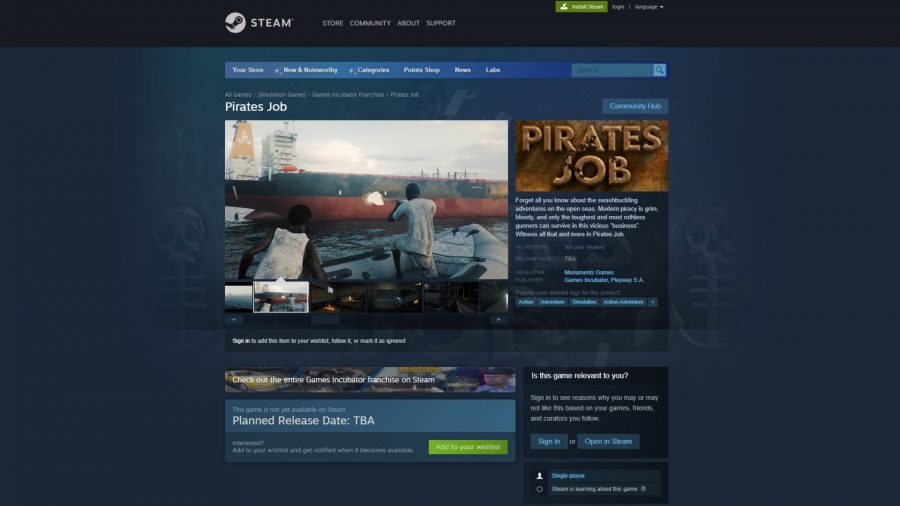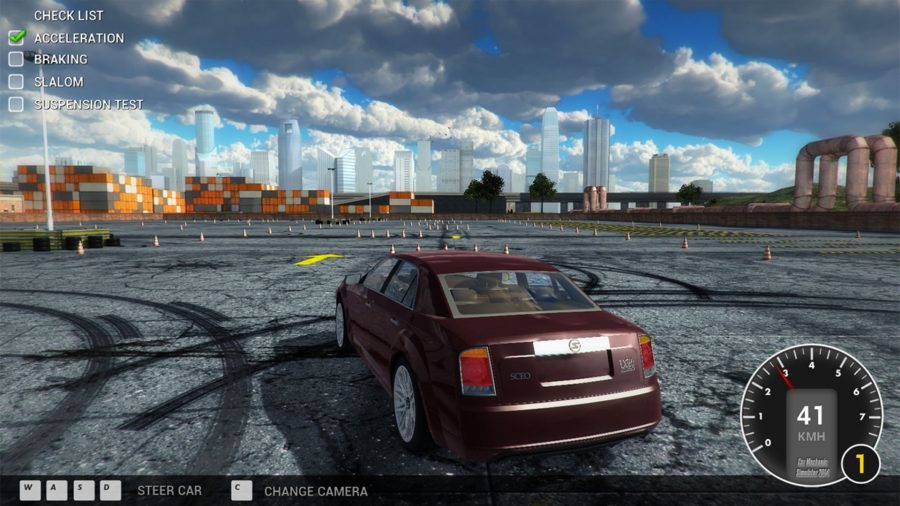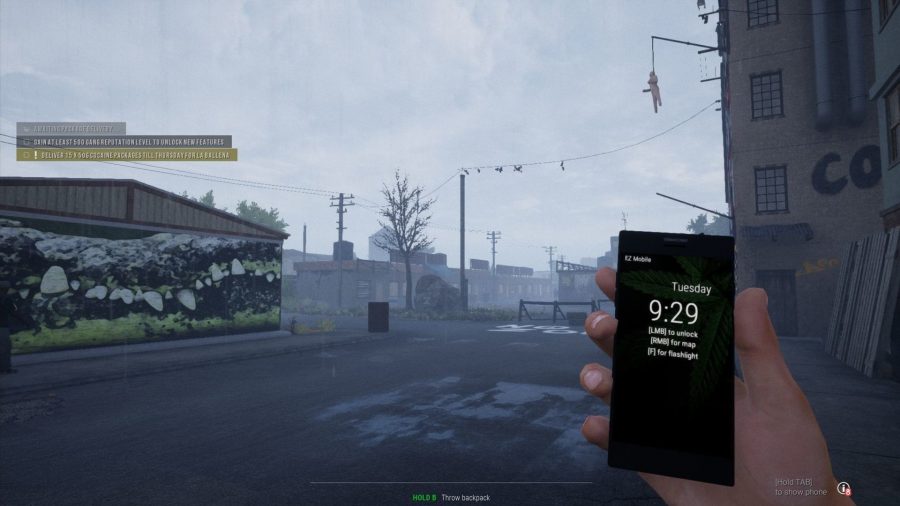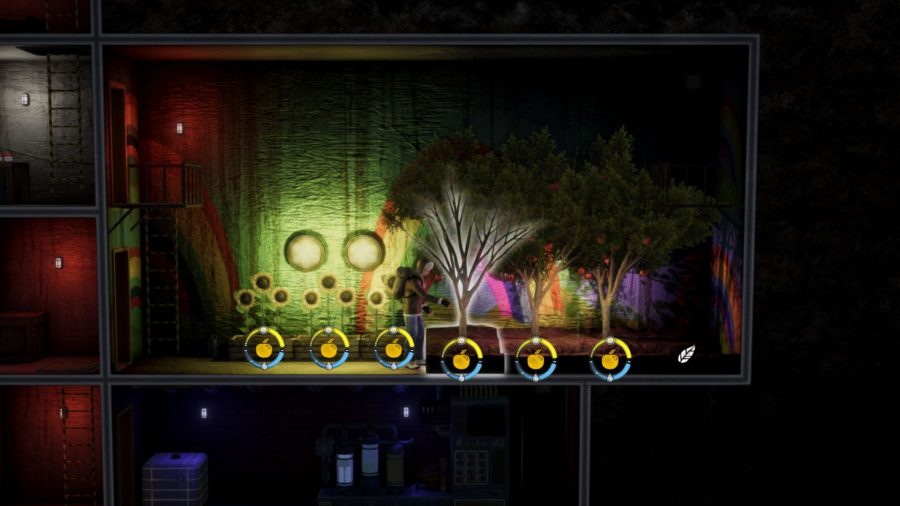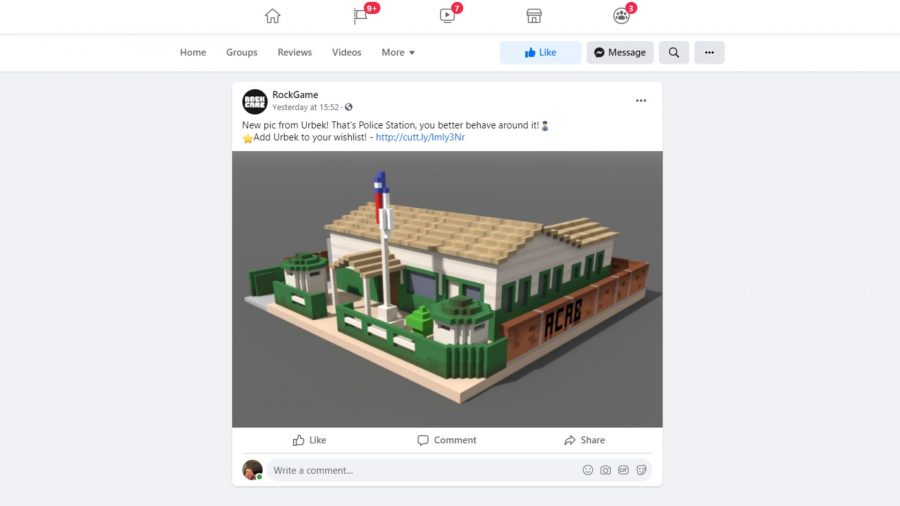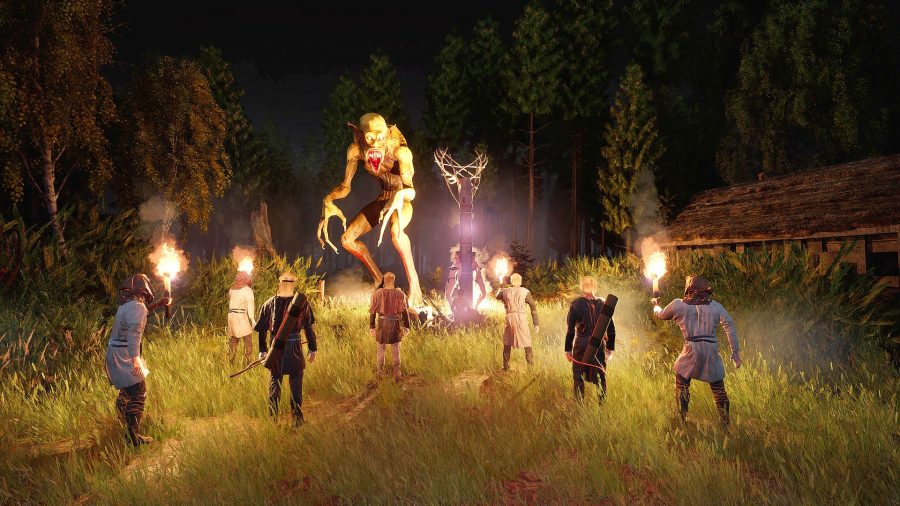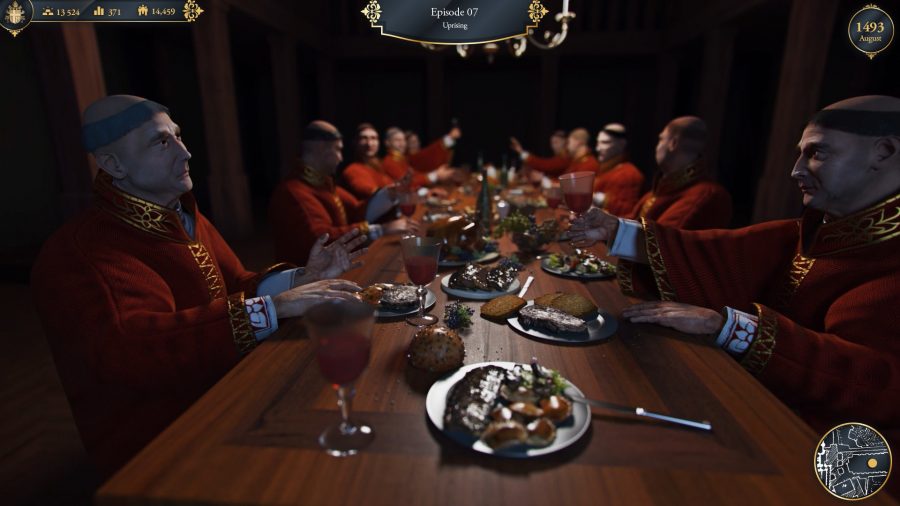- Joined
- Jan 28, 2011
- Messages
- 99,504















Informative article at PCGamesN: https://www.pcgamesn.com/playway-steam-games-ads-on-facebook
Investigating the strange Steam games advertised on Facebook
'80s crime sims, vampire sagas, and games about orgiastic popes sound great, but are they really what they seem?
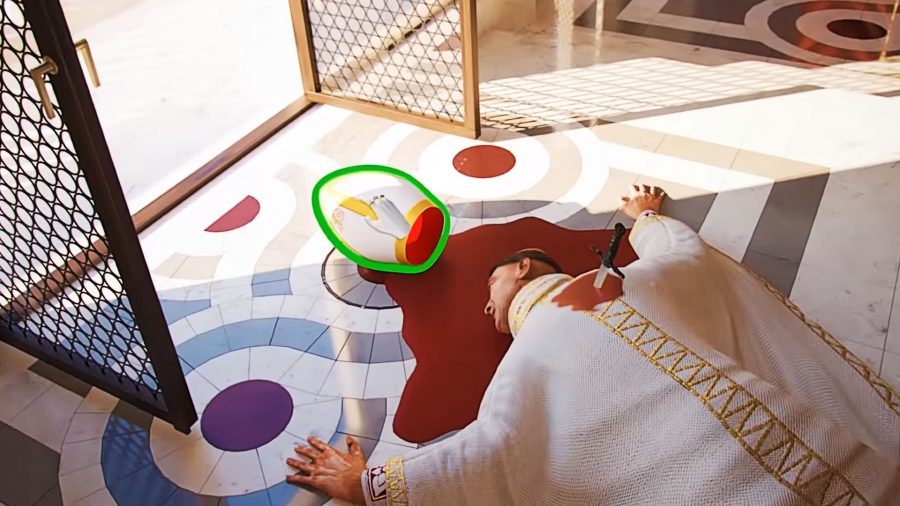
Facebook, for reasons only fully understood by its data-harvesting algorithms, knows that I’m a gamer. Not only does it know that I’m a gamer, but based on the recent barrage of not-yet-released Steam games it advertises at me, it seems to know exactly what kinds of games will catch my attention. Lead Catholicism as a sinful and corrupt sex-addict pope? Tell me more! An ’80s-themed Vice City rip-off? Yes! Junkyard Simulator? Errr, ok. Sure.
Other trailers are a little less savoury, like Bum Simulator or Pirates Job (don’t correct the grammar – it’s exactly as intended), which casts you not as the colourful characters of Caribbean folklore, but AK-toting east African pirates shooting up oil rigs and commercial vessels. Not quite the pirate fantasy I had in mind, but no worries; there’s an ad catering to that, too.
Here’s the thing, though. Many of these games don’t exist. They have no release windows, some aren’t even in development, and they may be abandoned or end up completely different to what those trailers tease. They might end up something akin to what’s teased, but it’s a long journey to get there, largely dependent on how players respond.
When noting the sponsors behind these trailers, a pattern began to emerge: the vast majority of them are connected in one way or another to a Poland-based company called PlayWay.
I managed to reach out to the head of PlayWay Games, Krzysztof Kostowski, to ask about their system – a conglomerate of 126 developers making, or at least advertising, over 100 games as I write this. A look at PlayWay’s official upcoming games list shows that only two out of 114 games have a set release date. This, I would discover, is a key part of PlayWay’s MO.
Krzysztof frames PlayWay as a bit of a rebel organisation, a breakaway from the big-money games-publishing rat race based around overhype, pre-orders, and crunch (all of which he says are non-existent at PlayWay). He says that PlayWay doesn’t sell off shares, despite being a major presence on the Warsaw stock exchange, and that his goal is “just to make Poland a key player on the world stage in the production of games, because what is Poland if not for its computer games? The other stuff hasn’t turned out so great.”
You may have heard of PlayWay already. It’s been behind several popular titles like House Flipper, Thief Simulator, and Mr Prepper – firm evidence that, on occasion at least, its method gets results. Its first breakout success was Car Mechanic Simulator 2014, which Krzysztof says was shunned at game expos. “When I was going to shows with this game, people weren’t interested at all”, he tells me. “Today I’m glad no one agreed to put money up for Car Mechanic, because it solidified our philosophy to always self-publish.”
From this point on, PlayWay became its own kind of game-making machine. Ideas for games are floated in bulk in an internal Discord group filled with developers from across PlayWay’s conglomerate. Once ten developers approve an idea, it enters pre-production, which in this case means heavily marketing the game concept via YouTube and Facebook ads, usually using CGI or pre-rendered trailers.
Crucially, the game also gets listed on Steam, even though there’s no release window or even in-engine footage. With a Steam Store listing, PlayWay can monitor demand through the wishlist, and gets a free community hub where it can see what players are saying about the idea, and what players want. “We read the comments, see what people say on Facebook, YouTube, and Steam, and we adapt to it”, says Kostowski. “Where else will we get those kinds of focus groups for free? Only on the internet.”
Kostowski says that PlayWay’s studios “try to stick to in-engine trailers”, but none of the Facebook trailers, nor many of the Steam trailers appear to abide by this. Of course, this doesn’t make PlayWay any worse than many other developers out there, and perhaps the onus is on Steam here to be more strict about what it requires from trailers. However, it doesn’t support Kostowski’s claims that PlayWay has a “pro-transparency stance” either. There’s at least a little sleight of hand here, but it looks innocuous next to many of those more established industry practices against which Kostowski positions PlayWay.
Kostowski concedes that not all the ideas churned out at PlayWay are winners. “There will of course be moronic or bad ideas”, he admits. “Techno Chicken, for example, or Redneck Party, which even though more than ten people voted for, a lot of people have to respond to the trailer for the concept to go further.”
With so many games lined up at any one time, it’s no surprise that Kostowski struggles to keep track of everything passing through PlayWay’s system. In Techno Chicken’s case, the game still has a Steam store page even though it seems to have been abandoned at the pre-rendered trailer stage. The other “bad idea” he mentions, Redneck Party, seems to have tentatively progressed into development, as indicated by the regular devlogs on the game’s Steam community hub.
With his company’s other ‘upcoming’ games, like Pirates Job and Pope: Power & Sin, Kostowski needed to look them up on Steam as we discussed them. It seems there’s so much proverbial spaghetti on the walls at Play Way, that much of it gets mistaken for stodgy wallpaper.
And many of these games are doomed to remain as little more than wallpaper on Steam. If a given idea doesn’t get enough traction with the public, then it will likely stagnate on Steam in perpetuity like Techno Chicken (Kostowski says that PlayWay has talked to Steam about removing these games, but the platform “isn’t so willing to”). Besides, whether a game is in development or not, every time a PlayWay game gets wishlisted it further solidifies the company’s position as the most wishlisted publisher on Steam. It all helps with the numbers – and we all know that investors love numbers.
If interest in a PlayWay project fizzles, another developer in the conglomerate can buy it, taking over its assets, graphics, and framework to continue development or even changing its direction completely. The successful Early Access game Drug Dealer Simulator, for example, was initially advertised as a game called No Drugs – which was about tripping out on psychedelic substances.
This was purchased by another PlayWay studio, who saw feedback that people wanted to trade drugs rather than take drugs. And so the new studio morphed No Drugs into Drug Dealer Simulator. Having played the game, it didn’t exactly deliver on the high-life fantasy promised in that first trailer, but it’s still in Early Access with nearly 9,000 reviews and a ‘Very Positive’ rating. The market has spoken.
If Techno Chicken lingers on Steam for long enough, perhaps it too will one day be revived as something more marketable. Or maybe people will forget about Goat Simulator and there will be a groundswell of interest in another farm-animal piss-around sim.
Some of these trailers may look uncannily similar to each other. That would be because the designs and frameworks behind PlayWay’s more successful games tend to get reused. Vampire Clans and Yakuza Empire, for example, are based on Mr Prepper, while simulation games like Space Mechanic and Junkyard Simulator seem to use the well-refined Car Mechanic Simulator framework. It’s the very definition of cookie-cutter development, and it works.
“There’s no clear rule on Steam that a game needs to be finished”, Kostowski says. “This breaks the rules of Kickstarter, it breaks the rules of pre-orders, but not Steam. Uboat was supposed to take two years; it took over four. Mr Prepper was supposed to take two years; it took over five. Our publishing plan has 110 games with 100 TBA – we don’t inform about release dates so we don’t need to stress about making that release tomorrow.”
According to Kostowski, this means that PlayWay avoids crunch altogether, which he doesn’t believe is beneficial to a game’s success. “Did crunch ever help CD Projekt? No.” Who knows, maybe PlayWay’s Cyberpunk Detective will be the Cyberpunk 2077 we all hoped for.
Another perk of not committing to launch dates is that PlayWay doesn’t burden itself with expectation. In the community hub for Builders of Egypt, an in-development game with a playable demo, one person complained about the lack of recent devlogs, saying that the developers should at least keep the community informed because they “bought into” Early Access.
But of course they haven’t bought anything. They may have emotionally bought into the concept, and spent time giving feedback to the developers, but the reality is that the developer hasn’t promised anything, so the player isn’t owed anything. Yes, it can leave gamers a little sour and disappointed when a project wanes, but at least it doesn’t leave them out of pocket.
Kostowski astutely compares PlayWay’s approach to Kickstarter, minus the overpromising, the money upfront, and the pressure. It even has shades of the now-defunct Steam Greenlight, in which users would vote on the pitches they wanted to see realised.
The main difference is that here the games stem from a kind of high-volume battery farm of marketable ideas rather than unique and creative passion projects. But while we can bemoan the formulaic quality of many of these games, it’s clear from the Steam reviews that plenty of people enjoy them, which is all the vindication PlayWay really needs.
Another company that crops up quite a bit in those Facebook ads is Gaming Factory, which appears to be mimicking the PlayWay system. “A few years ago, a company called Gaming Factory bought five pre-production games [from us] that weren’t going anywhere”, Kostowski says. “They went public and are now finishing those games. They don’t seem to be selling that well, but they’re out there and that’s something.”
That means there’s now a company hoovering up games rejected by PlayWay, which itself was founded on games rejected by traditional publishers. How deep does this reject rabbit hole go?
Like PlayWay, Gaming Factory too has a schedule of upcoming games. Only six out of 31 are out now, while the rest remain without release dates. If PlayWay’s own schedule is anything to go by, then the gap between released games and upcoming games will grow alongside the company.
These schedules are integral to attracting investors. “We can’t put games on a plan that aren’t at a meaningful point in production, because it would mislead investors”, Kostowski says. Looking at the version of PlayWay’s releases list cached from 2019, however, there are at least 25 games on there that are listed on Steam but are yet to have so much as a demo over two years on. Some games have been sold on to Games Factory, while a small number of titles, like Plastic Love and Repo Man, have disappeared from the list altogether.
Kostowski points to Steam devlogs as a key indicator of a game’s progress, but some games like Crime Scene Cleaner and Farm&Fix haven’t had devlogs or announcements in over a year. But hey, at least we got Wanking Simulator. It got a demo earlier this year and apparently there’s a VR version “cuming soon”.
PlayWay’s release list seems well padded, which is no doubt attractive to investors who can click through and see those shiny trailers and Steam pages marked ‘Coming Soon’. It seems to be leading investors on a bit, but from a gamer’s perspective it makes a nice change to have the financial risk shifted away from the consumer. And if you are concerned about the welfare of those poor investors, then rest assured that their investments have on balance paid off over the years.
So when you see these trailers on Facebook, it’s important to keep them in perspective. Like all great marketing, most of them are just selling a fantasy at that point – shallow but well-choreographed concepts designed to engage and gauge the collective gamer unconscious.
If you want a game, you give it a Like, you comment, you add it to your wishlist, then you park your expectations about how it will look at the other end of the development process. If it ever makes it.
Or you can get involved with the game’s community on its Steam page and have an active input in its development. Just understand that development may stop or change direction at any point, and that the low budgets of most of these games inevitably limit their scope, so don’t expect I Am Jesus Christ to be the Second Coming.
It’s certainly refreshing to hear a games company stand against practices like pushy pre-orders, crunch, and misleading Kickstarter campaigns. PlayWay’s approach – messy and mass-produced though it may be – is effective, and offers some kind of alternative even if its games line-up has single-handedly created a whole new lower-budget, lower-quality tier of eurojank.
And yet, when someone teases me with a game about endless Papal transgressions, it taps into the lapsed Catholic in me and I just can’t resist. So excuse me while I add The Pope: Power & Sin to my wishlist.







